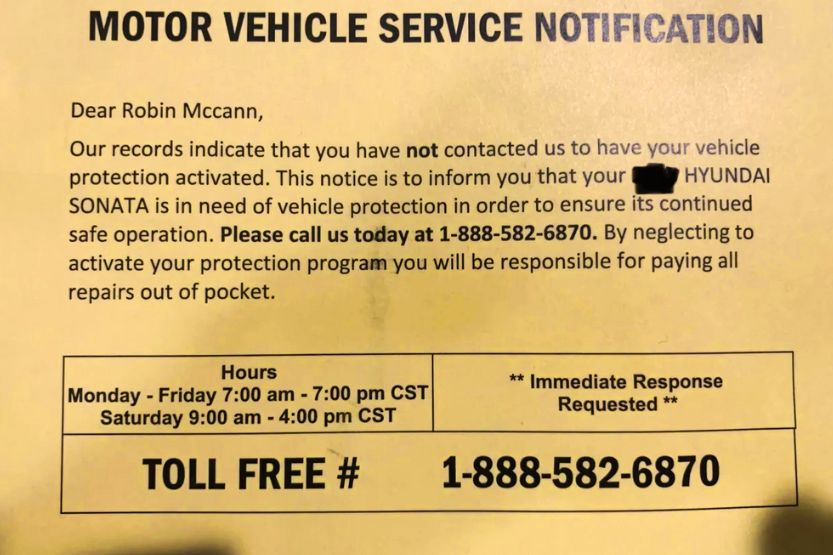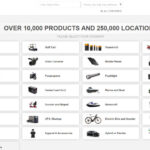Don’t readily believe it if you receive a motor vehicle services division letter or notice reminding you that your car’s warranty is about to end. More often than not, it is accompanied by a solicitation for extended warranty service. Is it legit or not? In this article, I’ll discuss the vehicle services division letter – is it a scam?
You can tell if the letter or notice is legitimate if it has the name of the company that sent it. If it does not bear the company name of the sender, then it probably came from a scammer and is not legit. Additionally, if it is accompanied by a solicitation that persuades you to get their extended warranty service, it is a scam.
More and more people are getting letters and notice out of the blue. The Federal Trade Commission warns consumers against trusting people who offer vehicle service contracts sent through letters or emails and advises against accepting these offers for vehicle warranties.
Read on to learn more about the vehicle services division letter you may receive in your mail, what they want, and what you can do if you receive such a letter or notice.
Vehicle Services Division Letter – What Is It?

Be careful if you receive a letter, notice, or postcard from the mail or email that seems to come from a particular vehicle service division entity. They may not be legit at all. If the letter has no company name, it was most likely sent by a scammer.
A legit reminder of the expiration of your car warranty will bear the name of the company that sent it. If the letter, notice, or postcard does not have a company name, it is more likely that it came from a scammer.
Such reminders or notices aim to get your money without giving you anything in return. They will most likely persuade you to get their extended car warranties. They will use fear to convince you to get their “extended warranties.”
These people will get your essential car information, like your car registration, plate number, or SSS number. And then, they’ll use this information to get you to sign up and pay for their “extended warranties,” or they can use your SSS number to skim your money off the bank.
These kinds of scams are getting more common, according to the FTC. You must be aware of them so if they try to persuade you; you will know what to do. This article will give you the information that you need to stop them from hitting you once and for all.
One important thing you should remember regarding your car warranty: if your car is still under warranty, don’t entertain any letters or notices about it if they did not come from the dealer where you bought your vehicle.
Why Did You Receive a Vehicle Services Division Letter?
Third-party Companies Offering Extended Car Warranties
You will most likely get this vehicle service division notice if your car warranty is nearing its expiration date. However, some people have received them even if their car’s warranty expiration is still months away. Surprisingly, some people who don’t even own cars receive them.
You might receive these letters or postcards if the dealer where you bought your car gives your car information to third parties which offer extended car warranties. That would not be an acceptable practice if you didn’t allow the dealer to get ahead and give others your car information.
Beware of Scammers
However, as the world operates its business today, you can’t expect business owners to adhere strictly to this critical rule. They somehow gain a profit from doing this. What you can do is to be aware of these scammers, how they operate, and how you can protect yourself against their nefarious ways.
Your car dealer may give you such notice when it’s about time your car warranty expires. However, they will not do it to frighten you. Indeed, they won’t bombard you with notices, letters, or postcards about it.
If they won’t ask for your car details, they probably came from the dealer where you bought your car. Remember you supplied the dealer with all the required personal information when you were still buying your vehicle?
So, they have no reason to ask for them now. They have all the necessary records to extend your car warranty if you want to.
Usually Threatens You to Extend Your Insurance
It would be different if a third party could get your car information through some means. Remember that even if someone has your details, it does not make their offer legit. The letter or postcard may look authentic, but you still need to validate it.
Perhaps there’s a logo in the letter or postcard, making it seem that the letter or postcard is legit. Don’t be easily fooled. People can make authentic-looking “official” Department of Motor Vehicles logos by copying the real ones and carefully printing them on a letter or postcard.
There’s one thing that will tell you if they are not real: though their letters, notices, or postcards appear authentic, they will use fear and force to get you to accept their extended car warranties. Don’t deal with such entities. They will only suck money out of you for nothing.
What Is a Motor Vehicle Service Notice?

Warns You of a Soon-to-Expire Manufacturer’s Warranty
Typically, a motor vehicle service notice is an unsolicited postcard or letter warning you that the manufacturer’s warranty will expire shortly. The notice aims to influence you intensely to extend the warranty.
Not All Notices Are Fake
They will make it appear that the notice came from the manufacturer or dealer. Though some notices come from the car maker or seller, most do not. They will also call you by phone repeatedly to force you to do it.
Not all of these companies are scammers, but most of them are. The notice may look authentic because it is in the form of a pink postcard that supposedly shows your car’s expiration date, warranty protection, and service records.
Investigate Further Before Signing Anything
In all appearances, these letters or notices look genuine and authentic. You must investigate further before signing anything to the company that sent it.
At best, you may find that the company does not cover most repairs, even those that the insurance agent claimed that they claim to cover. Worst, they may not fulfill their promise. Most companies will take your money and vanish without a trace.
You will find that the phones they used before where you could communicate with them are no longer working. No one answers them when you need to ask anything or if you have any complaints.
Overpriced Insurance Rates
One more thing: even if the company is legit, you will find that their insurance rates are overpriced. The prices of their policies are typically way over the standard repair costs of well-established car service centers.
Car owners who buy extended warranties don’t use them very much if they use them at all. This makes extended car warranties useless and wastes your money.
Final Warranty Notice
Also, understand that most of these scammers use the phrase: “Final Warranty Notice” to strike fear in your heart and get your attention. That is meant to force you to communicate with them as soon as possible. If you see this phrase on the notice, throw it in the trash can.
Again, what is a vehicle services division letter? A vehicle services division letter notifies you of a soon-to-expire car warranty.
What Are the Signs That the Notice Is Legit?

Some signs will show whether the warranty expiry notice is real. Just look at these signs in the letter or postcard you receive from a company before deciding whether or not you will buy into what they offer:
1. Has the Company Name and Phone Number that Match Your Car Maker’s Warranty
This is the first thing you will see when you open the notification letter. It must indicate a company name and telephone number that are the same as what you can see in your car’s manufacturer’s warranty.
If you can’t find your original documents, you can search for the car manufacturer’s website and check if it’s the same as what is printed on the notification letter. If they don’t match at all, trash the letter.
More importantly, if the notification letter contains no company name and address but only a telephone number, it is highly probable that it is a scam.
2. Respectful Company Rep
Try calling the phone number that is indicated in the notification letter. If the agent that handled your call is respectful and open to your questions and honestly answers them, then they must be legit.
However, if the company agent readily says that you should really get the extended warranty right away or the price can go up if you dilly dally, then they are using fear and force so that you will buy their warranty. Avoid this kind of people.
3. Letter Indicates the Company’s Address
The letter could come from a scamming company if the address printed on the envelope (or the notification) were sent from a different state other than yours.
4. Has All Your Basic Information
The notification letter is legit if it contains all your basic information, including that of your car. If the agent asks you to supply any basic personal information, including your car’s model and year, then be wary. They are fishing for your details that they can use to skim money from your pocket.
5. Has the Correct Price for Your Car
If the letter indicates the price of your car is the same as the price in your original receipt, then it can be legit. Otherwise, discard the letter if it indicates an incorrect price.
6. The Letter Came at the Right Time
Authentic warranty notices should come around when the warranty is about to expire or when the warranty grace period is slightly over. Most car warranties cover from 3 to 5 years or 36,000 to 50,000 miles.
If you received the notification about this time or are a little over it, it is a good sign that the letter is legit. However, if it is too early or too late, it is probably from a scamming company. Just ignore it or throw the letter or notice in the waste bin.
In Closing
A letter that supposedly was sent by your local motor vehicle services division can be legit or a scam. You can tell if it is a scam if it has the name of the company that sent it. If there’s no company name on it and only a phone number, it must have come from a scammer and is not legit.
Additionally, if the letter or postcard is persuading you to get extended warranty service, that’s a giveaway that it is indeed a scam.
The FTC warns consumers against trusting those who offer vehicle service contracts sent through letters, postcards, or emails out of the blue and persuading you intensely to get their service contracts.




![AutoZone Services and Prices [Full List] autozone services and prices](https://roadsumo.com/wp-content/uploads/2022/10/Autozone-services-and-prices-150x150.jpg)




